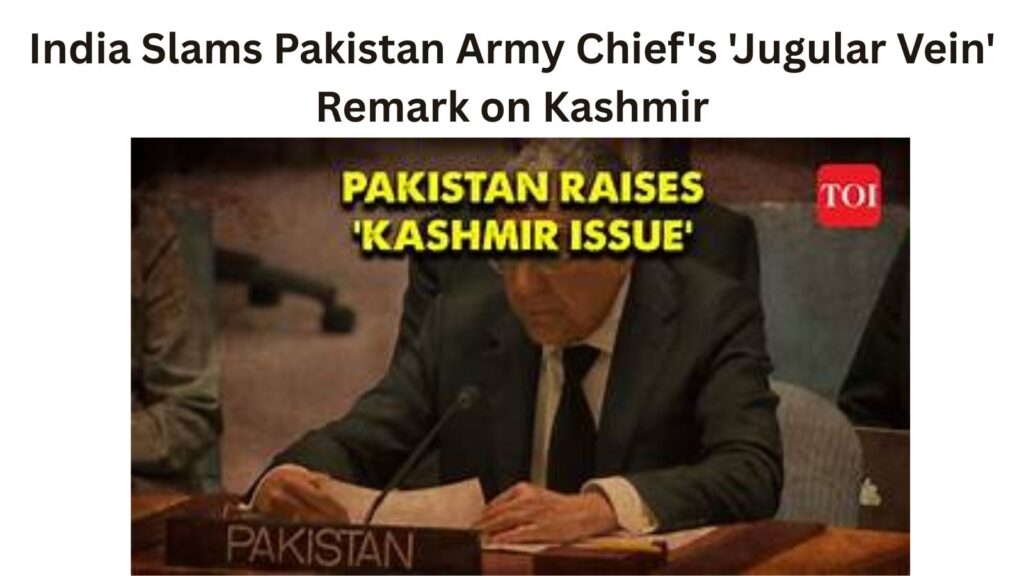India Slams Pakistan Army Chief’s ‘Jugular Vein’ Remark on Kashmir: Full Analysis
The Kashmir conflict is an old territorial dispute between India and Pakistan. It remains a source of tension and complexity in South Asia. Pakistan’s Army Chief, General Asim Munir, recently made waves by calling Kashmir Pakistan’s “jugular vein.” This phrase carries significant historical and ideological weight. It has sparked a strong reaction from India, showing how sensitive the Kashmir issue remains.

This article covers General Munir’s statement and India’s response. We also discuss the history of the Kashmir dispute, recent events in the region, and how these affect India-Pakistan relations.
Understanding the “Jugular Vein” Remark
General Asim Munir’s statement was made during an address to a gathering of Pakistanis residing abroad. He stressed that Kashmir is Pakistan’s “jugular vein.” This shows how vital it is to Pakistan’s identity and policies. This rhetoric aligns with Pakistan’s longstanding position on Kashmir, viewing it as a core issue of national interest.
The term “jugular vein” has been historically used by Pakistani leaders to signify the vital importance of Kashmir to Pakistan. It shows that the region is vital to Pakistan’s survival and identity. This idea has shaped Pakistan’s foreign policy since it began.
India’s Response: A Strong Rejection
India’s Ministry of External Affairs (MEA) swiftly condemned General Munir’s remarks. MEA spokesperson Randhir Jaiswal said that Kashmir is a key part of India. He added that Pakistan’s only role in Kashmir is to leave the illegally occupied areas. India firmly stands by its position on Kashmir and is committed to its territorial integrity.
India’s response shows that Kashmir is an internal issue. So, any foreign intervention or claim is not acceptable. The MEA’s statement serves as a reaffirmation of India’s sovereignty over Jammu and Kashmir.
Historical Context of the Kashmir Dispute
The Kashmir conflict dates back to the partition of British India in 1947, which led to the princely state of Jammu and Kashmir acceding to India. Pakistan disputes this accession. It claims the region due to its majority Muslim population. The dispute has led to several wars and ongoing tensions between the two nuclear-armed neighbors.
The first Indo-Pak war over Kashmir occurred in 1947-48, shortly after the partition. The conflict ended when the United Nations brokered a ceasefire. This led to the creation of the Line of Control (LoC). The LoC divides the region into Indian-administered and Pakistani-administered areas.
Wars in 1965 and 1999, like the Kargil War, deepened the divide and raised tensions. The 1972 Simla Agreement, signed by India and Pakistan, focused on solving disputes through talks. It also confirmed the LoC as the real border.
Recent Developments in Kashmir
Kashmir is still unstable. There are often clashes between militants and Indian security forces. In recent clashes in Indian-administered Kashmir, three suspected militants died. An Indian army officer was also killed in separate gunfights. These events highlight ongoing unrest in the area. They show the difficulties in keeping peace and stability.
The ongoing militancy and infiltration attempts from across the LoC continue to fuel tensions. India claims that Pakistan supports terrorism in the region. Pakistan denies this, calling the struggle a legitimate freedom movement.
The Role of the Military in Shaping Policy
General Munir’s comments show how much Pakistan’s military affects its foreign policy, especially toward India. The military usually takes a tough stance on Kashmir. This view shapes public discussion and affects diplomatic talks.
Pakistan’s military has historically played a central role in the country’s politics and foreign policy. Its dominance in national affairs often leads to a focus on security. This can hurt diplomatic efforts and increase tensions with nearby countries.
International Reactions and Diplomatic Implications
The international community continues to monitor the situation closely. Countries call for dialogue and peace, but India and Pakistan’s strong positions make diplomacy tough. The “jugular vein” comment could make normalizing relations even harder.
The United Nations and other international groups have always pushed for talks and a peaceful end to the Kashmir conflict. However, the lack of trust and the entrenched positions of both countries have impeded meaningful progress.
Conclusion
General Asim Munir’s statement serves as a reminder of the deep-rooted and complex nature of the Kashmir dispute. India’s firm rejection of Pakistan’s claims reinforces its commitment to sovereignty and territorial integrity. Resolving the Kashmir issue is tough. It needs ongoing talks and a real commitment to peace from everyone involved.
The Kashmir conflict is not just a territorial dispute; it is a deeply emotional and ideological issue that impacts the lives of millions. To achieve lasting peace, India and Pakistan need to go beyond words. They must have honest talks that focus on the concerns and hopes of the people in Kashmir.
Economy Auto Parts: Save Money Without Sacrificing Quality
FAQs
General Munir stressed that Kashmir is key to Pakistan’s identity and policy. Its importance to the country is paramount.
India’s Ministry of External Affairs condemned the remark. It reaffirmed that Kashmir is an integral part of India. The ministry also called on Pakistan to leave the illegally occupied territories.
The conflict began in 1947. That year, Jammu and Kashmir joined India. Pakistan disputed this decision. This led to several wars and ongoing tensions.
Yes, recent clashes between militants and Indian security forces have caused casualties. This shows the ongoing unrest in the region.
Pakistan’s military greatly influences the country’s foreign policy. This is especially true for issues related to India and the Kashmir dispute.
Note: This article relies on publicly available information and aims to provide a comprehensive overview of the topic.






